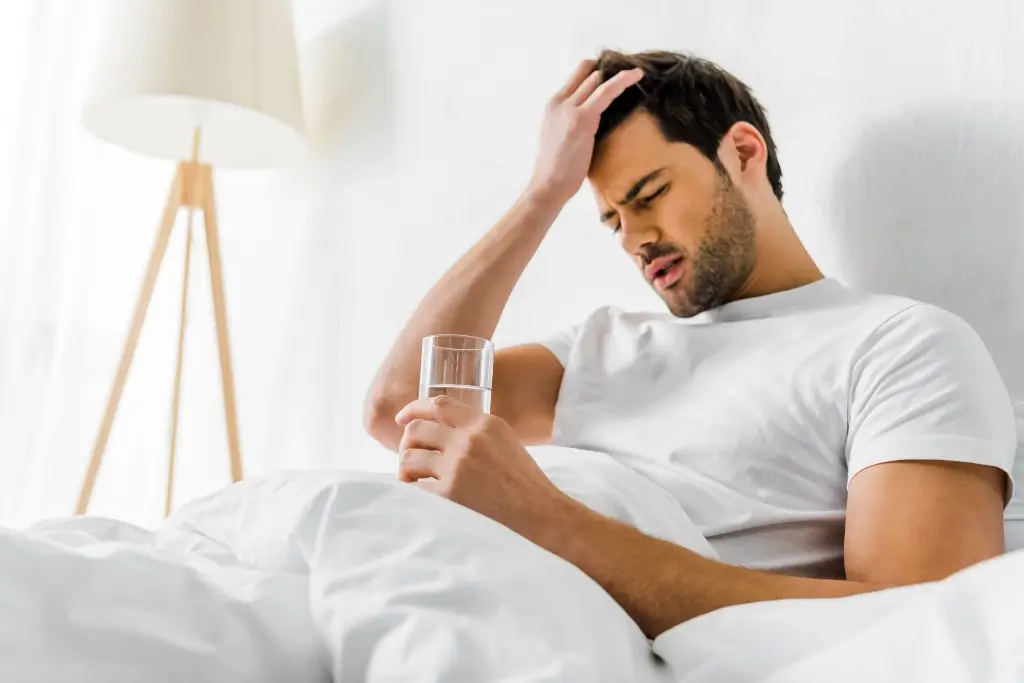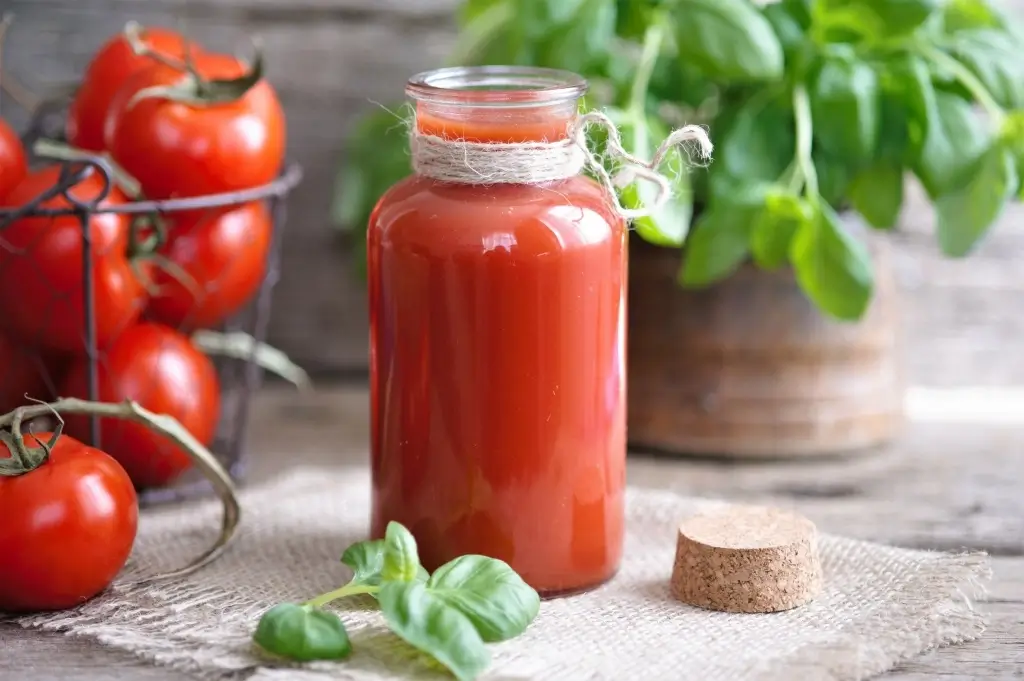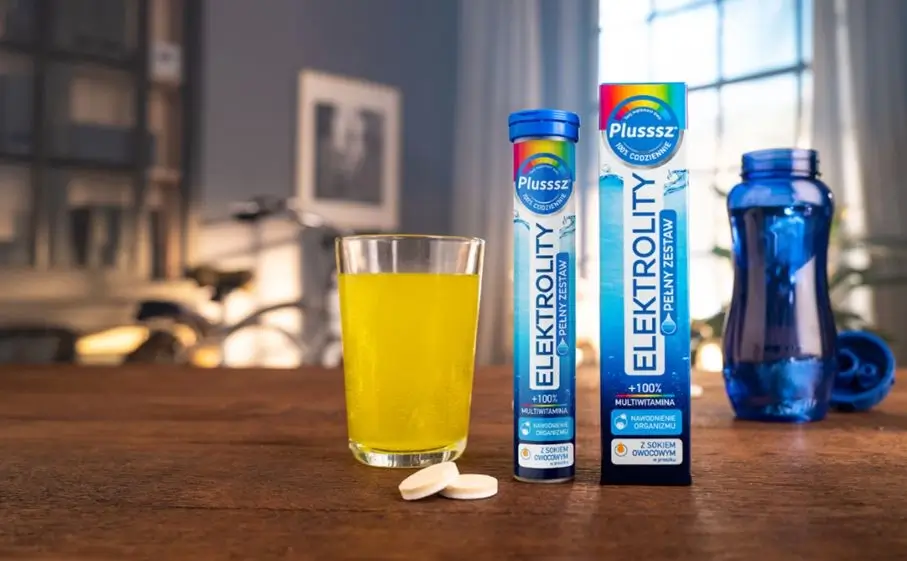The deterioration of well-being and symptoms of a hangover after drinking alcohol are unpleasant but physiological reactions of the body, which metabolizes the alcohol consumed and returns to its disturbed balance. Depending on gender, age, the amount of alcohol consumed and the body’s ability to process it and return to form, a hangover can last from several hours to even a day after drinking the last portion of alcohol.
Alcohol, regardless of the amount consumed, has a harmful effect on the body. A person who wants to lead a healthy, balanced lifestyle should completely give up alcoholic beverages. There is a common belief that some types of alcohol have a beneficial effect on the body, e.g. wine or beer. We debunk this myth. Indeed, the above-mentioned beverages contain ingredients that can have a beneficial effect on the body, e.g. polyphenols and antioxidants, but the alcohol content always has a negative effect on the body. There is no safe dose of alcohol that is recommended to drink.

Fig. 1. Alcohol always has a negative effect on the body.
Of course, the situation mentioned above is one of those ideal ones and rarely happens in reality. Drinking alcohol during certain occasions has become a permanent part of culture. How to deal with the unpleasant symptoms of a hangover when we no longer have control over the amount of alcohol consumed and, colloquially speaking, “the milk is spilled”? How to quickly get back in shape? Can a hangover be prevented while drinking alcohol? Are there vitamins and minerals that are worth taking after drinking alcohol? You will find the answer to these and other questions in the article below, we invite you to read.
Hangover – definition
To properly understand the physiological causes of a deterioration in well-being after a boozy party, you must first define what a hangover is.
A hangover is a deterioration in well-being, both physically and mentally. The deterioration occurs the next day after a single episode of drinking too many drinks containing alcohol. The characteristic symptoms of a hangover begin to appear when the blood alcohol level begins to drop (the body metabolizes alcohol and removes it from its tissues) or when it is close to zero. Contrary to the opinions of many people, a hangover does not only occur after drinking strong alcohol, it can also occur after a single episode of drinking drinks considered weak, e.g. wine, beer, alcoholic cocktails.
The first symptoms of a deterioration in well-being usually appear in the morning, after a night’s sleep. A hangover can last from a few to even 24 hours after drinking. The duration of symptoms depends on many factors, including:
- body weight in relation to the amount of alcohol consumed, counted in units;
- gender;
- general level of hydration and concentration of vitamins and minerals in the body;
- general condition of the body, excretory and metabolizing systems (liver, kidneys).
What are the symptoms of a hangover? The degree to which you feel a decrease in your mood and physical well-being also depends on several factors, including the amount of alcohol consumed. Most often, a hangover manifests itself in a rather characteristic way; the combination of symptoms with the fact of drinking alcohol the previous day usually does not give room for discussion about other causes of poor well-being.

Fig. 2 The symptoms of a hangover are characteristic, including fatigue and headache.
The symptoms of a hangover include:
- a feeling of fatigue, a worsening of well-being, a worse mood – this is a typical, most common symptom, which may (but does not have to, in milder conditions) entail other symptoms of a hangover;
- a feeling of thirst combined with a dry mouth, dry skin and a noticeable reduced level of body hydration;
- loss of appetite, discomfort from the digestive system;
- sleep disorders, problems falling asleep or, on the contrary, a feeling of overwhelming, difficult to control drowsiness;
- impaired attention and concentration, difficulty concentrating, inability to perform daily duties;
- memory problems.
Why do you have a headache after a boozy party? Physiological causes of a hangover
There are many causes of a hangover and symptoms experienced during sobering up, and the effect of alcohol on the body is multifaceted. A hangover occurs because:
- alcohol has a direct negative effect on the brain and other organs and body systems;
- in the process of alcohol decomposition (metabolism), compounds are produced that have a negative effect on the body;
- alcohol consumption promotes other behaviors that are harmful to well-being, which are not without significance for the condition of the next day, including smoking, eating heavy, processed food, lack of sleep, etc.
How is alcohol metabolized? The consumed portion of alcohol is converted into acetaldehyde in the liver. This substance is responsible for the occurrence of most unpleasant symptoms on the day after drinking. In some people, the process of breaking down alcohol into metabolic products is faster, and in others, slower and less effective. In people who process it faster, usually shortly after drinking a glass of vodka or wine, you can observe redness of the face and hands and increased sweating, which is related to accelerated blood circulation and increased blood pressure.
It is believed that the longer the drinking period and the greater the amount of alcohol consumed during this time, the greater the chance of experiencing symptoms related to a drop in mood and a worsening of well-being, i.e. a hangover.
As previously mentioned, alcohol has a negative effect on the body’s organs and tissues. The direct effects of drinking several or a dozen portions of alcohol are:
- Electrolyte imbalance and reduced tissue hydration
Water is an essential substance thanks to which the body is able to function in a physiological way. When drinking alcohol, a mechanism related to alcohol’s inhibition of vasopressin is activated. Vasopressin is a hormone that is responsible for the accumulation of water in the body at the level of renal filtration. If its action is inhibited, excessive urine excretion and sweating occurs. Along with urine and sweat, we lose water and electrolytes, i.e. anions and cations of elements responsible for the metabolism of water in the body and the conduction of electrical impulses between nerve cells.
- Digestive system disorders, gastrointestinal complaints
Their cause is very simple. Alcohol is an irritant. When it reaches the stomach and then the intestines, it irritates the tissues lining these organs, which in turn leads to increased production of stomach acid, pancreatic and intestinal enzymes. It is this process that is responsible for the nausea and discomfort in the abdomen that many people experience during a hangover.
- Lowering blood glucose levels
Usually, glucose levels do not drop too quickly. A single episode during which a person has consumed too much alcohol does not cause such symptoms. Glucose levels can drop after several days of drinking. Because simple sugars (glucose) are the main fuel and source of energy for the brain, lowering their concentration can cause a feeling of tiredness, fatigue and problems with concentration.
- Sleep disorders, problems with the biological clock and the natural rhythm of sleep and wakefulness
After drinking alcohol, drowsiness is felt. Unfortunately, sleep resulting from drinking significant amounts of alcohol is of much poorer quality than natural sleep. If you drink alcohol in the evening or at night (which is typical behavior resulting from its social and sociable role), it can lead to sleep rhythm disorders. This does not necessarily result from the direct effect of alcohol on the human body, but is an accompanying symptom resulting from the conditions of drinking.
How to reduce the risk of feeling unwell?
First of all, it should be noted that drinking alcohol in any case leads to negative changes in the body. Alcohol is considered an irritant and has a degenerative effect on protein. We recommend reducing the amount of alcohol consumed, and ultimately refraining from drinking them.
Drinking alcohol can reduce the risk of the “morning after syndrome” in the morning. How to do it? Try to replenish your fluids regularly, drink portions of alcohol, preferably water or water with juice, and avoid sweetened and carbonated drinks.
If you like tomato juice, consider drinking it with alcohol. It hydrates the body perfectly and provides it with additional vitamins and minerals, including electrolytes that are so important for fluid balance – sodium and potassium.

Fig. 4. Tomato juice will replenish fluids and lost vitamins well.
Drink sensibly, maintaining breaks between subsequent portions of alcohol. By extending them, you will reduce the risk of getting drunk and uncontrolled exceeding the amount of vodka or wine that you intended to drink.
While drinking, take care of your diet, limit heavy meals and do not overeat. Fatty, fried foods will not protect you from discomfort and fatigue the next day, on the contrary, they can contribute to a deterioration in well-being and, for example, cause nausea. Read also: Spring equinox – how to support the body at the turn of winter and spring?
Take care of the good condition of the body every day – diet and exercise
A properly hydrated and nourished body will cope better with alcohol metabolism in most cases. The effects of drinking it will be milder and easier to bear. Take care of your diet every day. Remember that the basis of a healthy lifestyle is exercise and the right amount of fluids.
A properly composed diet should contain saturated carbohydrates. You will find them in dark bread, pasta, groats and rice. Supplement your meal with vegetables. You should eat 5 portions a day. What does this mean? That vegetables should be part of every meal. Usually, we eat too few of them or replace them with fruit, which is a wrong action. Fruit can be a great snack, a decoration on the plate, which will encourage you to eat and make the meal associated with pleasant experiences.
Red and blue fruits (e.g. raspberries, blueberries, currants, etc.) contain a lot of antioxidants and polyphenols – compounds that have a protective effect on the body’s tissues and organs. Other types of fruit (apples, grapes, pears, watermelon, bananas) mainly provide vitamins and minerals, the correct supply of which effectively prevents episodes of poor well-being – also after drinking excessive amounts of alcohol.
Supplement your diet with good quality protein, choose meat and fish from certified farms. Try not to eat meat with visible fat. Choose lean types – chicken, turkey, rabbit or beef (note: beef should not be eaten more than 1-2 times a week).
Magnesium will come in handy every day and before an event where you plan to drink alcohol. Where to find it? In nuts, almonds and cocoa.

Fig. 5. Nuts are a great source of magnesium.
Ways to deal with a hangover
Alcohol has existed in Western culture and beyond for a very long time. Traditionally, it accompanies the celebration of important events, and in the past it played an important role in ceremonies and rituals, e.g. related to the change of seasons. Although it has been with us for so long, there is still no effective and scientifically proven method or miraculous antidote that would help completely deal with the bothersome symptoms of fatigue, weariness and deterioration of well-being after drinking alcohol.
If you overdid it with alcohol the previous day, you can use a few methods on an ad hoc basis that will make it easier to survive this difficult time and make you feel a little better.
- Relieving a headache
A headache and photosensitivity are some of the more persistent symptoms of a hangover. You can relieve them with home remedies. First of all, it is recommended to rest in a dark, quiet and cool room. High ambient temperatures can make you feel worse.
Apply a cold compress to your head. You can make it yourself from a towel soaked in cold water or choose a ready-made cold pack from the pharmacy. If these solutions are not convenient for you, we recommend cooling patches.
- Replenishing fluids and restoring the correct level of hydration
During the drinking of alcohol, the body’s electrolyte balance was disturbed. Some of the symptoms that appear during a hangover are related to this phenomenon. Replenish fluids, of course reaching for only non-alcoholic drinks. The basic source of fluids and electrolytes is water and fruit and vegetable juices. If you have an appetite, you can drink a few cups of broth or vegetable stock. It will not only hydrate you, but also provide elements such as sodium and potassium.
If you do not want to drink juice, and water puts you off with its lack of taste, try a ready-made electrolyte preparation in the form of effervescent tablets soluble in water or a preparation with vitamins and minerals. Preparations of this type have a refreshing fruity taste and an easy-to-take form. Just dissolve the tablet in a portion of cold water and drink it. Vitamin preparations will work especially well for those who find it difficult to force themselves to eat and supplement, for example, vitamin C, potassium or calcium in the form of a meal. Don’t know how to choose the right product? Dietary supplement Plusssz Electrolytes + 100% Multivitamin is a preparation that combines all the advantages associated with the choice of effervescent tablets soluble in water containing electrolytes: a comprehensive composition, delicious fruity taste. Thanks to its convenient form, you can always have it at hand and reach for it when you feel that you need an additional portion of hydration.

Fig. 6. An electrolyte supplement is a convenient and effective way to replenish fluids, vitamins and minerals during a hangover.
- Try to replenish blood glucose
Drinking alcohol is associated with a drop in blood sugar (glucose) levels. To replenish it, eat a small, easily digestible meal. Reach for a piece of bread, rusks or crackers. If you have an appetite, eat a meal containing fruit – you will replenish lost vitamins and electrolytes.
- Give yourself time to rest
You need sleep and time to regenerate. Sleep longer than usual, especially if alcohol consumption was associated with an all-nighter and a late return home. Fatigue is not only the result of too low a level of minerals, but also lack of sleep and intense socializing the previous day.
If you don’t have to go to work the next day, take a day off, you will quickly get back in shape, and the poor well-being associated with fatigue will not accompany you for the rest of the week.
Vitamins and minerals to help you cope after drinking alcohol
Hangover symptoms are also a time of increased demand for vitamins and minerals. Below we have collected information about the ingredients that you may need especially now.
| Ingredient | Properties |
| Magnesium |
|
| Potassium |
|
| Vitamin C |
|
| Iron |
|
Table 1. Properties of selected minerals and vitamins.
Questions and answers about hangover remedies
Can the digestion and processing of alcohol be sped up somehow? I want to sober up as soon as possible.
Indeed, there is a common opinion in the popular media and in society that exercise or certain components of the diet (fats) can affect the acceleration of the rate of alcohol decomposition. This is not true. The rate of alcohol metabolism depends on many factors, mainly individual, and there is no method that would allow it to be removed from the blood faster.
Physical exercise or certain foods do not affect the time it takes for the blood alcohol level to drop to zero.
There is currently no method that has been scientifically proven to be effective in directly preventing or relieving a hangover. We also point out safety, do not trust methods cited on the internet, they are not always safe.

Fig. 7. Give yourself time to rest, it’s better than looking for miracle methods for a hangover.
To improve your well-being, we recommend resting and hydrating your body. Replenishing electrolytes lost in urine and sweat can also have a positive effect on reducing the feeling of fatigue after drinking too many alcoholic beverages, but it will not affect the sobering up process. If you have doubts about your condition, refrain from driving and duties that may require sobriety, concentration, quick reactions and the ability to focus.
How to check if your blood alcohol level has dropped to zero?
Unfortunately, apart from measuring the concentration of alcohol in exhaled air or performing a laboratory test on a blood sample, there is no reliable and certain method that would give you certainty that the alcohol that was drunk the previous day has already been broken down and excreted from the body.
Remember that even if the entire portion of alcohol has been metabolized, you may still feel unpleasant symptoms of a hangover – fatigue, boredom, impaired concentration and attention. Refrain from driving, if you can, take a day off work, because during a hangover you are a danger to both yourself and others – this advice is particularly relevant to people who are professionally responsible for working with heavy machinery, for example, but everyone should give themselves time to rest, relax and regain their balance.
Can eating certain foods while drinking alcohol protect me from a hangover?
As with methods of combating the “day before syndrome”, in this case too there is no scientific evidence to show that consuming, for example, animal fats protects against the occurrence of symptoms of weakness and decreased well-being the next day after the party.
Of course, a properly nourished body can cope better with a hangover. People who usually take care of hydration will also feel less water loss after drinking alcohol.
Eating fast food, hard to digest, fried and fatty foods can worsen your well-being the next day, and alcohol further exacerbates discomfort from the digestive system. Choose light snacks and try not to overeat, this will make you feel better the next day.
Summary
A hangover is a physiological reaction of the body to drinking too much alcohol. There are no scientifically proven and confirmed methods of dealing with a hangover. By resting, hydrating the body and replenishing the necessary minerals and vitamins, you can deal with its occurrence.
Bibliography:
- Swift R., Davidson D. Alcohol Hangover. Mechanisms and Mediators, “Alcohol health and research world” 1998; no. 22, vol. 1, pp. 54-60.
- Fudała J., Safe drinking alcohol, “Medycyna Praktyczna” 2018.
- Ślósarska M., Alcohol metabolism, “Alkohol i nauka” 1999, no. 4.
A balanced diet and a healthy lifestyle are important for maintaining health.
